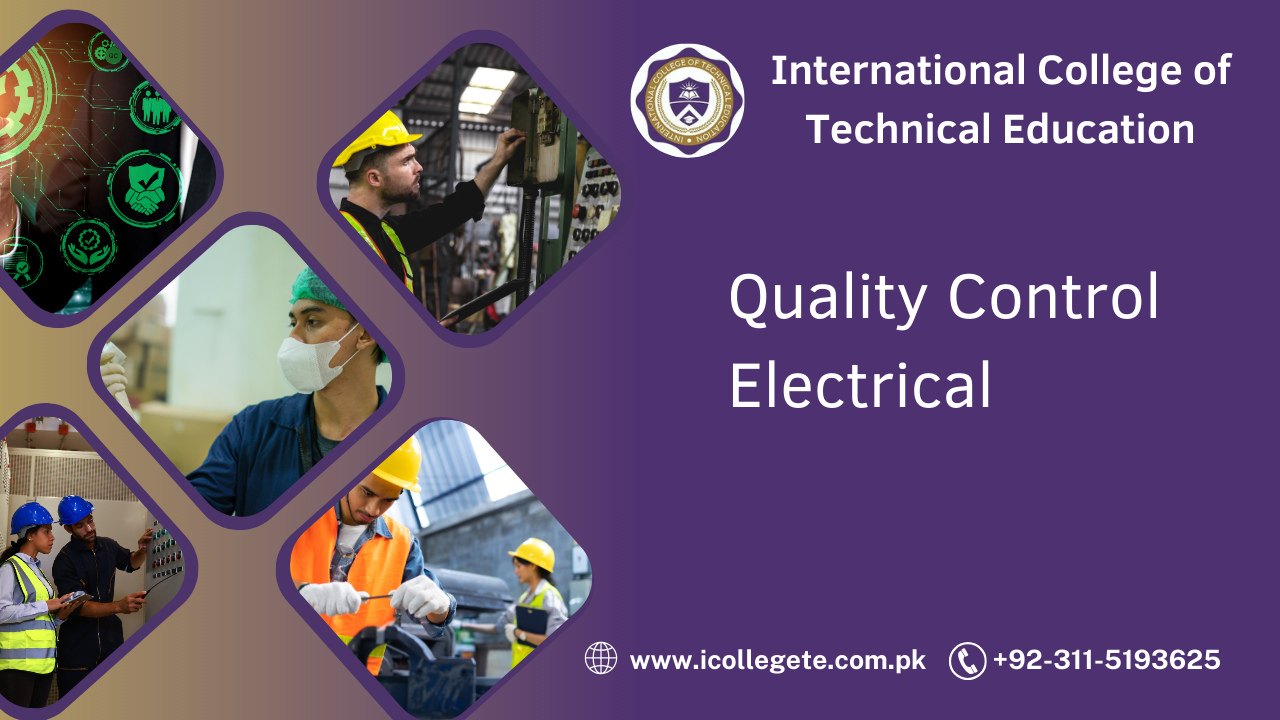In the modern world, electrical systems are essential to the functioning of buildings, industries, and infrastructure. Whether it’s in construction, power generation, or manufacturing, ensuring that electrical systems meet the required safety and performance standards is crucial. The Quality Control Electrical Course in Sargodha is designed to equip individuals with the expertise needed to maintain high standards of quality in electrical installations and maintenance.
The Quality Control Electrical Course in Sargodha focuses on equipping students with the skills to manage and implement quality control practices in electrical systems. This course covers both theoretical and practical aspects of electrical quality control, from understanding electrical components to testing systems for compliance with national and international standards. Students will learn to apply quality assurance principles to various electrical installations and operations, ensuring that they meet strict safety, functionality, and regulatory standards.
This course is particularly beneficial for those working in electrical engineering, construction, and maintenance sectors, providing them with the tools to ensure that electrical systems function safely and effectively.
Course Overview
The Quality Control Electrical Course is a comprehensive training program that delves into the principles, techniques, and tools necessary to maintain and improve the quality of electrical systems. The course covers a wide range of topics, including electrical circuit analysis, testing methods, fault detection, and adherence to safety regulations. It also teaches students how to conduct quality control checks, review electrical installations, and monitor the performance of electrical equipment.
Students will gain hands-on experience with the latest testing instruments and methods used in electrical quality control, learning how to identify and address potential issues before they impact the system’s performance or safety.
Study Units
The Quality Control Electrical Course in Sargodha includes the following study units:
- Introduction to Electrical Quality Control
This unit introduces students to the concept of quality control in the electrical field. Students will learn the importance of quality assurance in electrical systems, including how it ensures safety, efficiency, and compliance with legal standards. - Electrical Components and Circuit Design
In this unit, students will gain an understanding of various electrical components and how they work within electrical circuits. They will learn how to assess and evaluate components based on their quality and reliability, ensuring the overall system operates as intended. - Electrical Testing Methods
This unit covers different testing methods used in electrical quality control. Students will learn how to perform tests on electrical circuits, components, and installations to verify compliance with industry standards and safety regulations. - Quality Assurance for Electrical Installations
Students will learn about the quality assurance processes specific to electrical installations, including how to monitor the installation process, identify potential issues, and ensure that all components are installed correctly and meet required standards. - Electrical Fault Detection and Troubleshooting
Fault detection is a critical aspect of electrical quality control. This unit covers the techniques used to identify and diagnose faults in electrical systems. Students will also learn how to troubleshoot problems and implement corrective measures. - Compliance with National and International Standards
This unit focuses on understanding the key regulations, codes, and standards that govern electrical installations and systems. Students will learn about national and international standards, such as IEC (International Electrotechnical Commission) and IEEE, and how to ensure compliance with these standards during installation and maintenance. - Safety Standards and Procedures in Electrical Systems
Safety is paramount when working with electrical systems. This unit covers the safety protocols and procedures that should be followed during electrical work. Students will learn how to manage risks, prevent accidents, and ensure safe operation in compliance with workplace safety regulations. - Documentation and Reporting in Electrical Quality Control
Proper documentation is essential in quality control. Students will learn how to record and report electrical testing results, inspections, and compliance audits, ensuring clear communication and accountability throughout the process. - Advanced Quality Control Techniques in Electrical Systems
This unit explores advanced techniques used in quality control for electrical systems, including automated testing, predictive maintenance, and the use of specialized tools and technologies for monitoring electrical equipment.
Learning Outcomes
By the end of the Quality Control Electrical Course in Sargodha, students will be able to:
- Understand the principles and importance of quality control in electrical systems.
- Identify and evaluate electrical components and circuits for quality and compliance with standards.
- Use various electrical testing methods to ensure the functionality and safety of electrical systems.
- Perform quality assurance checks on electrical installations to ensure they meet required specifications.
- Detect and troubleshoot faults in electrical circuits and systems.
- Apply national and international standards to electrical systems and installations.
- Follow safety protocols to ensure safe working conditions and prevent accidents.
- Maintain proper documentation and reporting of quality control activities in electrical systems.
- Implement advanced techniques for improving the quality of electrical systems and preventing issues.
Course Benefits
- Comprehensive Knowledge: The course provides a deep understanding of electrical quality control, covering both theory and practical skills.
- Industry-Recognized Standards: Students will learn to apply national and international standards, making their skills applicable in any country.
- Practical Experience: Hands-on training in testing, troubleshooting, and quality assurance will prepare students for real-world applications in the electrical field.
- Enhanced Career Opportunities: With increasing demand for qualified professionals in the electrical sector, completing this course can improve job prospects and open doors to better roles in quality control, installation, and maintenance.
- Improved Safety and Efficiency: By learning how to apply quality control measures, students contribute to the safe operation and longevity of electrical systems, reducing downtime and the risk of electrical hazards.
- Skill Development: Students will develop problem-solving skills, attention to detail, and the ability to assess and address electrical issues efficiently.
Who Is This Course For?
The Quality Control Electrical Course in Sargodha is ideal for:
- Aspiring Electrical Engineers: Those interested in entering the electrical engineering field and specializing in quality control and assurance.
- Electrical Technicians: Individuals already working as electrical technicians who want to formalize and expand their knowledge in electrical quality control.
- Construction Professionals: People working in construction who need to ensure the quality of electrical systems in new buildings and infrastructure projects.
- Maintenance Engineers: Engineers responsible for the ongoing maintenance of electrical systems who want to improve their skills in quality assurance and troubleshooting.
- Project Managers: Those overseeing electrical projects and looking to integrate quality control practices into their project management.
- Safety Officers: Professionals responsible for ensuring safety in electrical installations and maintenance who want to gain a deeper understanding of quality control measures.
Future Progression
Graduates of the Quality Control Electrical Course can pursue a range of career opportunities, including:
- Electrical Quality Control Inspector: Inspect and test electrical systems to ensure compliance with safety standards and regulations.
- Electrical Project Manager: Oversee electrical installation projects, ensuring that quality control processes are followed throughout the project lifecycle.
- Electrical Maintenance Engineer: Manage the maintenance and repair of electrical systems, ensuring they meet quality standards and perform optimally.
- Quality Assurance Manager: Lead quality control teams, developing and implementing processes to maintain high standards in electrical systems.
- Electrical Safety Officer: Monitor and enforce safety regulations related to electrical installations and maintenance.
- Consultant: Work as an independent consultant, advising companies on how to improve their electrical systems’ quality and safety.
Additionally, graduates can further enhance their qualifications by pursuing advanced certifications in specialized areas such as Six Sigma, ISO 9001, or NEC (National Electrical Code) certification.
The Quality Control Electrical Course in Sargodha is an essential training program for anyone interested in ensuring the safety, efficiency, and compliance of electrical systems. Whether you’re just starting in the electrical industry or looking to advance your career, this course provides the necessary knowledge and practical experience to help you succeed in quality control roles. With the growing demand for skilled electrical professionals, this course is an excellent opportunity to build a solid foundation for a successful career in electrical quality control.







